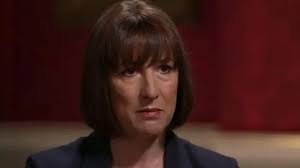Rachel Reeves: Flouncing Through the Wreckage Like an Overdrawn Prima Donna
Britain’s Chancellor spent years fiddling her CV—now she’s fiddling the economy
POLITICS
Ed Grimshaw
2/14/20254 min read


Rachel Reeves, the woman Labour promised would be the economic messiah, has instead turned out to be one of those prophets who stands on a street corner holding a sign that says The End is Nigh. Her first Budget has gone down like a lead balloon filled with taxpayers' hopes and dreams, and the UK economy—previously just wobbling on a tightrope—has now tumbled off into a rather large and inconvenient sinkhole.
Naturally, Reeves flounced onto the public stage to present her fiscal catastrophe with all the misplaced confidence of a middle manager who once “optimised cross-departmental synergy” and now believes they’re the rightful heir to John Maynard Keynes. The reality? Less Keynesian brilliance, more a frantic woman trying to balance the books while still covering a few motivational wine bottles and a well-timed Gucci handbag.
At this point, it’s difficult to know whether Reeves is actually running the economy or simply running a performance piece about what would happen if you handed a corporate expense account to a woman who never quite learned the word no.
The Budget That Sank Faster Than an HBOS Share Price
Her first Budget was meant to be Labour’s grand statement—a moment to show that, after years in opposition, they knew what they were doing. Instead, it felt like an elaborate prank, the fiscal equivalent of turning up to an AA meeting with a bottle of gin.
She delivered her Budget speech with all the bombast of a Shakespearean soliloquy, head held high, convinced she was about to go down in history as the Margaret Thatcher of Keynesianism. But as she flounced away from the Commons chamber, the markets did something rather inconvenient: they collapsed in horror. Investors, apparently unconvinced by her mixture of performative optimism and implausible sums, promptly ran for the hills, taking the pound with them.
The numbers weren’t so much not adding up as they were actively mocking her. Growth? What growth? Wages? Flattening like a pancake. Inflation? Back like a boomerang. Meanwhile, Reeves stood at the Treasury podium, speaking in that oddly self-assured tone of a woman who has never once considered she might be wrong.
The only people still backing her were Keir Starmer—who, at this point, probably couldn’t sack her without first holding a people’s consultation on the optics of sacking a woman in a leadership role—and a handful of Labour MPs who had no idea what was going on but felt it was important to cheer anyway.
From Expenses to Economic Decline: A Natural Career Progression
But should we really be surprised? This is, after all, a woman whose previous brush with financial responsibility ended in an HBOS expenses investigation that conveniently vanished when she left the company. Now, she’s treating Britain’s economy with the same level of meticulous care she once applied to motivational bonuses for her PA.
Reeves' fiscal strategy seems to be inspired by her own approach to handling money: if it looks bad, deny all knowledge; if it can’t be denied, blame the system; if the system won’t take the blame, flounce off and pretend nothing happened.
Take her handling of government spending. She’s cut investment but increased borrowing, slashed incentives for business but increased public sector hiring, and somehow managed to make both the unions and the corporations furious. The real genius, though, is that she’s managed to dress this all up as stability.
Which is a bit like setting fire to your house, standing in the ruins, and announcing that you’ve just improved the central heating.
Flouncing Into Financial Oblivion
Flouncing, it must be said, is Rachel Reeves’ true calling. She doesn’t walk onto the stage—she arrives, as though she's just been informed that her services are required for an emergency production of The Importance of Being Earnest. When faced with criticism, she does not merely respond—she declares, with the righteous indignation of a Victorian widow hearing that the servants have been taking liberties with the port.
After her Budget bombed, she emerged from the Treasury with all the composed calm of a woman who had definitely just spent the last 20 minutes screaming at an intern. Asked about economic stagnation, she insisted that things were going exactly as planned, which is a remarkable statement considering the plan appears to involve tanking business confidence and turning the UK into an elaborate social experiment in how long a country can survive on vibes alone.
It’s a wonder she doesn’t simply lean into her dramatic tendencies and start arriving at press conferences in a billowing cape, demanding that we all believe in her economic miracle.
Rachel Reeves: Chancellor or Economic Liability?
At this stage, even Labour supporters are struggling to explain why she’s still in post. Keir Starmer, who remains constitutionally incapable of making a decision without first consulting at least three focus groups and a polling agency, continues to insist that she’s doing a fantastic job. The markets disagree. So does, well, reality.
Meanwhile, Reeves is doing what she does best: flouncing through disaster with the theatrical confidence of a woman who has never been held accountable for anything in her life. If Britain’s finances continue their downward spiral, don’t expect a resignation. Expect a performance—one in which she casts herself as the tragic heroine who was simply too brilliant to be appreciated.
Of course, by that point, the economy will be in ruins, the pound will be worth less than a Motivation card, and the only people left with money will be the ones who saw this all coming and bought shares in European property.
So, if you need her, Rachel Reeves will probably be somewhere between the Treasury and a wine bar, loudly insisting that she’s still an economist at heart. The rest of us? We’ll just have to live with the consequences.
